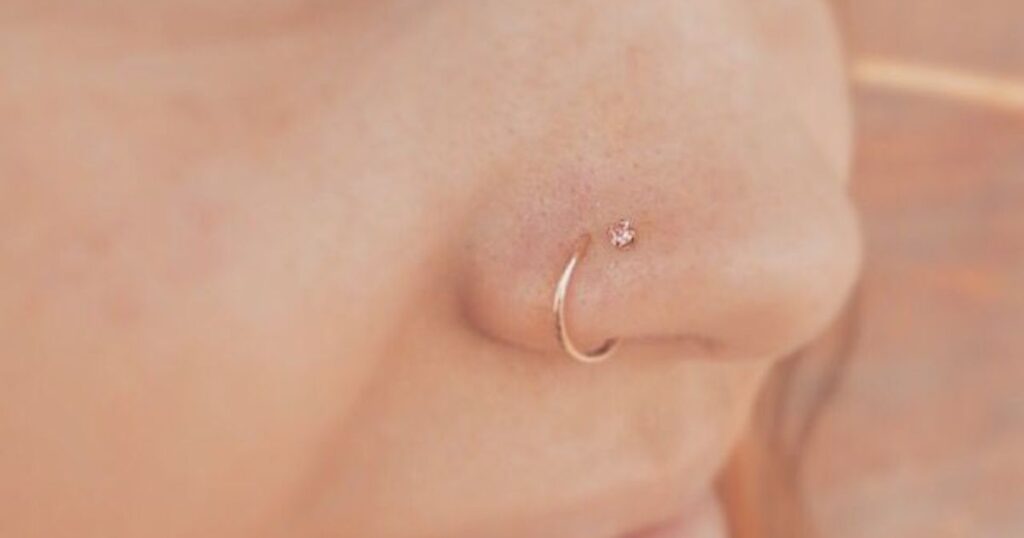A bad smell from your nose ring may be due to bacteria, dead skin cells, or trapped debris around the piercing. Inadequate cleaning or using harsh cleaning products can contribute to odor. Regular cleaning with a saline solution and avoiding irritants helps maintain a fresh and odor-free nose ring.
Curious about an unpleasant odor from your nose ring? Wondering, Why Does My Nose Ring Smell Bad? Dive into the reasons and discover easy solutions for a fresh and odor free piercing experience.
The unpleasant smell from your nose ring may stem from bacteria, dead skin cells, or debris accumulation around the piercing. Inadequate cleaning or harsh products can contribute to this issue. Regular cleaning with a gentle saline solution helps prevent odor and maintain a hygienic nose piercing.
Common Causes of Bad Smell
The common causes of a bad smell in a nose ring often involve the presence of bacteria, accumulation of dead skin cells, and trapped debris around the piercing. Inadequate cleaning practices, such as irregular or harsh cleaning, can contribute to this issue. Understanding these factors is essential in addressing and preventing unpleasant odors.
| Common Causes of Bad Smell in Nose Rings |
| Bacterial Presence |
| Accumulation of Dead Skin Cells |
| Trapped Debris Around the Piercing |
| Inadequate Cleaning |
| Use of Harsh Cleaning Products |
| Lack of Regular Cleaning |
| Ignoring Aftercare Instructions |
| Presence of Irritants |
| Dryness Around the Piercing Site |
| Neglecting Exfoliation |
Maintaining hygiene through regular cleaning with a gentle saline solution helps eliminate bacteria and keeps the piercing fresh. Avoiding irritants and adopting proper cleaning techniques are key to preventing common causes of bad smells in nose rings. Taking these steps ensures a clean and pleasant piercing experience.
Bacterial Presence and Its Role
Bacterial presence around a nose ring plays a key role in causing unpleasant odor. The warm and moist environment around the piercing can foster bacterial growth. These bacteria can contribute to the breakdown of skin cells and other debris, leading to the distinct smell.
Regular and gentle cleaning with a saline solution is effective in reducing bacterial activity and maintaining a clean and odor-free nose piercing. Proper hygiene practices are crucial to minimize bacterial presence and ensure a fresh and comfortable piercing experience.
Accumulation of Dead Skin Cells
The accumulation of dead skin cells around a nose ring is a common cause of unpleasant odor. As the skin naturally sheds, these cells can get trapped, creating a breeding ground for bacteria and contributing to the smell.
Regular cleaning with a gentle saline solution helps to prevent the build-up of dead skin cells and maintain a hygienic environment around the piercing.
Gentle exfoliation may also be beneficial, ensuring a fresh and odor-free nose ring. Proper care and attention to the accumulation of dead skin cells are essential for a clean and comfortable piercing experience.
Trapped Debris Around the Piercing
Trapped debris around a nose piercing can contribute to an unpleasant smell. This debris, which may include dead skin cells and bacteria, accumulates over time if not properly cleaned.
Regular cleaning with a gentle saline solution is crucial to prevent debris buildup and maintain a hygienic piercing. Avoiding harsh products and being mindful of irritants help ensure the area around the piercing stays clean.
Adequate care and cleanliness practices are essential to prevent the trapping of debris, promoting a fresh and odor-free nose piercing experience. Ignoring this issue can lead to potential complications, making regular maintenance a key aspect of nose piercing aftercare.
Impact of Inadequate Cleaning
The impact of inadequate cleaning on nose rings can lead to unpleasant odors due to bacterial growth, dead skin cell accumulation, and debris buildup. Neglecting regular cleaning routines can exacerbate these issues, compromising the hygiene of the piercing.
Harsh cleaning products may irritate the skin, contributing to discomfort and persistent odor. To avoid these issues, it’s crucial to prioritize gentle cleaning with a saline solution, promoting a clean and odor-free nose ring.
Proper cleaning not only maintains hygiene but also ensures a more comfortable and visually appealing piercing experience. Regular care is essential for preventing the negative consequences of inadequate cleaning and promoting overall piercing health.
Harsh Cleaning Products and Their Consequences

Using harsh cleaning products on your nose ring can lead to adverse consequences, such as irritation, dryness, and disruption of the piercing’s natural balance. These products may strip the skin of essential oils, exacerbating odor issues.
Gentle cleaning with a saline solution is recommended to maintain hygiene without causing harm. Harsh chemicals can also trigger allergic reactions, emphasizing the importance of choosing mild, piercing-friendly solutions.
By avoiding abrasive products, you ensure a more comfortable and healthy piercing experience, minimizing the risk of complications associated with aggressive cleaning practices. Regular, gentle care is key to preserving the integrity of your nose piercing and preventing undesirable consequences.
The Significance of Regular Cleaning
Regular cleaning is vital to prevent unpleasant odors in nose rings. It helps eliminate bacteria, dead skin cells, and debris that can accumulate around the piercing. Consistent cleaning with a gentle saline solution is key to maintaining hygiene and a fresh-smelling nose ring.
Ensuring Claire’s nose piercings are safe involves using gentle saline solutions as part of the cleaning routine. This simple practice prevents unpleasant smells and maintains a fresh, comfortable piercing experience.
Using gentle saline solutions is a crucial step in maintaining a clean and odor-free nose ring. Saline helps cleanse the piercing without harsh chemicals that may contribute to irritation or dryness. By regularly applying a saline solution, you can effectively remove bacteria and debris, promoting a hygienic environment.
FAQs
Why does my nose ring develop a bad smell?
The unpleasant odor is often attributed to bacteria, dead skin cells, or trapped debris accumulating around the piercing.
How does inadequate cleaning contribute to nose ring odor?
Inadequate cleaning allows the buildup of bacteria and debris, leading to a bad smell. Regular and thorough cleaning is essential to prevent this issue.
Can harsh cleaning products worsen the smell of a nose ring?
Yes, harsh cleaning products can contribute to odor by causing irritation or dryness. Using gentle saline solutions is recommended for effective and safe cleaning.
How does the accumulation of dead skin cells affect the odor of a nose ring?
Dead skin cells can trap bacteria and debris, creating a breeding ground for odor. Proper cleaning and exfoliation help prevent this accumulation.
What role does regular cleaning with a saline solution play in preventing nose ring odor?
Regular cleaning with a gentle saline solution helps remove bacteria and debris, ensuring a hygienic environment and preventing the development of a bad smell in the nose ring.
Conclusion
A bad smell from a nose ring is commonly associated with the accumulation of bacteria, dead skin cells, and trapped debris around the piercing. Inadequate cleaning, especially with harsh products, can exacerbate the issue.
The key to preventing unpleasant odors lies in regular and gentle cleaning with saline solutions. This practice effectively removes impurities, maintaining a hygienic environment and promoting a clean and comfortable nose piercing.
Neglecting the importance of proper cleaning may lead to persistent odor and potential complications. By adopting a consistent aftercare routine, individuals can enjoy a fresh and pleasant nose piercing experience, highlighting the significance of understanding the causes and implementing effective solutions for maintaining optimal piercing hygiene.



















